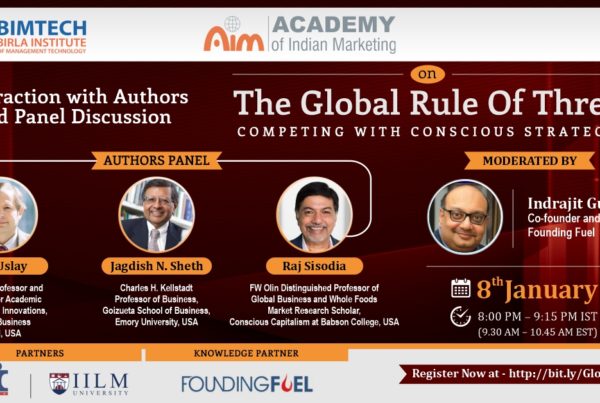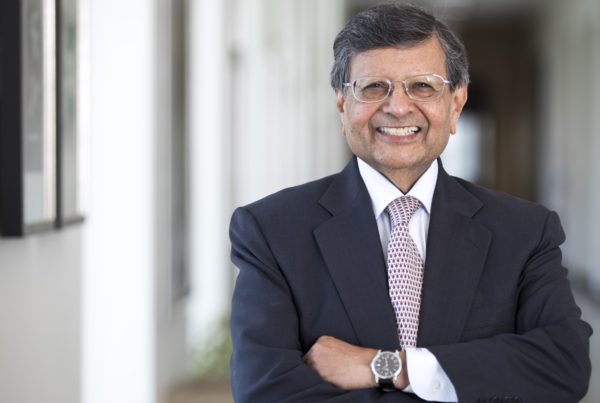Published: Apr 09, 2003 in Knowledge@Emory
Unilateral action may prove an effective way to win the war in Iraq, but some scholars at Emory University and its Goizueta Business School say that it’s not a good strategy for winning more world trade. Despite the sweetheart deals some U.S. companies seem likely to receive in post-Saddam Iraq, some Emory University scholars believe America’s current tendency to go-it-alone on a wide range of global economic, environmental, legal, and military issues could have a longer term negative impact on the U.S. economy.
Whether the issue is global warming, the world criminal court, or international trade, the Bush Administration’s refusal to commit to a variety of international agreements in the past several years has frustrated many of America’s largest trading partners, according to Jagdish Sheth, a marketing professor at Emory University’s Goizueta Business School. And in politics as in physics, every action has a reaction: Sheth believes that one result of this unilateralism will be reluctance to trade with or invest in the U.S.
Even if the war ends quickly, Sheth believes that international frustration with the U.S. will not dissipate. “I’m convinced that the war is just an excuse,” for other countries to act on their frustration with the U.S., notes Sheth, who specializes in global business strategy. “Whether the war finishes quickly or is prolonged will make no difference to the distancing from America because America has become unilateral in its decision-making.”
Ironically, Sheth speculates that the root of the current difficulty for business may be Bush’s management style, which he says seems to be more like that of a CEO than that of a conventional politician – a tendency to just “get it done” with no debate or behind the scenes maneuvering. As an example, he says, the decision in 2002 to increase steel tariffs was made without any advance discussion with the European Union. And Bush’s commitment in the same year to increase subsidies to U.S. farmers on a range of agricultural products was equally surprising to many developing countries eager to sell their products and be competitive on the global market, he says.
But successful policymaking typically requires much more compromise than running a business, observes Sheth. “Behind the scenes there’s quite a lot of give and take, a lot of nurturing, a lot of pre-tuning that precedes a given position, and obviously the current president’s chemistry is not like that,” Sheth says.
Harold Berman, a professor of international law at Emory’s School of Law, says the Bush team’s lack of diplomatic finesse has hurt America’s international standing. “[U.S.] actions in the war you can disagree with, but you could see that some people might justify them,” he says. But the lack of diplomatic savvy “is really unjustifiable.”
However, Tibor Varady a professor of international trade law at Emory’s School of Law, believes the war has played an important role in intensifying resentment of the U.S.’s protectionist positions. “Without the war, I don’t think we would have reached a crisis,” he says. “There would have been some bitterness but probably again some compromise.”
Varady says he thinks the war may have jeopardized the “basic core of trust,” between the U.S. and its major trading partners that helped limit damage in past trade disputes. “While we’ve had these economic disputes [before], there was quite a lot of bitterness but there was some underlying ground-layer of trust, and now I think the ground-layer of trust is jeopardized.”
Does it matter? Militarily, it may not. However, Sheth points out that the economic consequences could be serious: the U.S. makes a lot of money – and borrows a lot of money – from many of the European and Asian countries it has annoyed. Japan and China alone hold over $470 billion in U.S. treasury bonds. In addition, unlike the U.S., some governments play key roles in their economies and thus have more influence on how money is spent. For example, Sheth notes that government purchasers in many of these countries may choose to not buy American – a potential problem as the U.S. is the number one exporter of arms, according to Sheth. In general, government budgets are spent mostly on defense, health care and education and all of them are in the public sector in most countries outside the United States. Public hospitals and schools might well avoid U.S. companies for their supplies as well. Government-owned airlines could choose to buy the European Airbus over the U.S.’s Boeing jets. And government-owned telecom companies might look elsewhere for their hardware.
In addition, pension funds, which are government-controlled in many countries, might decide to look nearer to home for investments or choose not to buy the U.S. Treasury bonds that finance the U.S.’s national debt. Businesses might be encouraged to make direct investments closer to home, rather than the U.S. And some developing country businesses could decide to conduct their international business in Euros rather than dollars.
Sheth is not alone in his pessimism. Bill Gross, the managing director of PIMCO, the nation’s largest bond fund, wrote recently that he believes after decades of growing the economy through a “virtuous cycle” of increasingly free trade, free capital markets, and a strong currency, the U.S. government is now turning on all three positions in order to finance its pursuit of terrorist containment. “We will experience a somewhat vicious cycle of policy reversal instead of the virtuous circle of recent decades, which led to higher profits and lower inflation. In the reversal’s wake will come subdued profits, higher inflation, a lower dollar and anemic financial returns,” Gross predicts.
But as many members of Congress are discovering, the global economic environment and business are intertwined, making it difficult to react to narrowly drawn political differences.< Last month 59 members of Congress who were angered by the French position on the war with Iraq, called for the cancellation of a Pentagon contract with Sodexho Alliance SA, an international catering firm based in a suburb of Paris. The agreement with the Pentagon includes an $881 million contract to feed U.S. Marines at 55 facilities, according to a recent article in The Washington Post. The article also indicated that the U.S. arm of Sodexho employs 110,000 people. Interestingly, this revelation has quieted some proponents. Yet Zheng Liu, an Emory professor of economics, says he believes making economic policy reversals for current advantage is ultimately a mistake. “I think a reputation is built up over time, and you might ruin it overnight,” he says. “Even though the U.S. has a much more attractive investment environment - other than the political instability - some people will seek more stable regions like the EU.” The problem such ongoing policy-making creates is that if a government keeps adjusting in order to maintain a temporary advantage, investors eventually adjust their behavior accordingly, Liu notes. For example, he says, if you say that you’re for free trade but then slap a tariff on steel, you might get a one-time advantage, but you’re unlikely to get trading partners to believe you the second time you say you’re for free trade – and the result is likely to mean less business for everyone in the long run. Many economists agree with this concept, Liu says, which was first proposed by Edward C. Prescott, currently at University of Minnesota, and Fynn E. Kyndland, Carnegie-Mellon University, in 1977. In their paper, Rules rather than discretion: the inconsistency of optimal plans, Prescott and Kyndland wrote that governments were better off setting consistent economic policies, such as regulation of the monetary supply, even if that meant giving up some short-term gains. “The reason that [government officials] should not have discretion is not that they are stupid or bad but, rather, that discretion implies selecting the decision which is best, given the current situation,” the authors concluded. “Such behavior either results in consistent but sub optimal planning or in economic instability.” What this means for the policymaker, according to Liu, is that even if an individual action is justified, over time it is likely to alter how other participants in the economy play the game. “You need to think, ‘well, if I do this discretionary policy, will people still play the same game with me?’”




